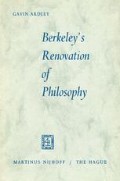Abstract
In these first chapters (I–IV) we shall be concerned for the most part with Berkeley’s critique of the exact sciences, and his reflections on human knowledge as they arose out of his reading of Locke and Newton. In fact, the young Berkeley had meditated a great deal about other philosophical issues, and had read other authors, notably Malebranche and Bayle (oblique references to these French philosophers abound in the Philosophical Commentaries, the Principles and the Three Dialogues), Nevertheless, it was on Newton’s natural philosophy that Berkeley concentrated his attention in the early published works; and to attain a conspectus of Berkeley’s endeavours it is appropriate to confine attention at first to this element. Later, we shall look at Berkeley’s work in a more ample setting.
Access this chapter
Tax calculation will be finalised at checkout
Purchases are for personal use only
Preview
Unable to display preview. Download preview PDF.
References
cf. John Locke, Thoughts Concerning Education 194.
“On the Pleasures of the Imagination,” The Spectator 413, Tuesday June 24th 1712. Berkeley HP II, p. 211 writes in a similar strain: is the visible beauty of the creation to be dismissed as a false imaginary glare? See also my “Philosophies of Appearance and Reality,” Philosophical Studies 1960.
Treatise of Human Nature ed. Selby-Bigge, pp. 226 f.
The Concept of Nature, Ch. 2.
Science and the Modern World, Ch. 3.
Ibid., Ch. 5.
e.g. Nicole Oresme’s commentary on Aristotle’s De Caelo (1377): here we find many of the elements of that matter and motion philosophy which would emerge into prominence some three centuries later.
We shall see later (XI, 4) something more of the significance of this figure.
Author information
Authors and Affiliations
Rights and permissions
Copyright information
© 1968 Martinus Nijhoff, The Hague, Netherlands
About this chapter
Cite this chapter
Ardley, G. (1968). The Problem of the Exact Sciences. In: Berkeley’s Renovation of Philosophy. Springer, Dordrecht. https://doi.org/10.1007/978-94-011-8872-2_1
Download citation
DOI: https://doi.org/10.1007/978-94-011-8872-2_1
Publisher Name: Springer, Dordrecht
Print ISBN: 978-94-011-8211-9
Online ISBN: 978-94-011-8872-2
eBook Packages: Springer Book Archive

